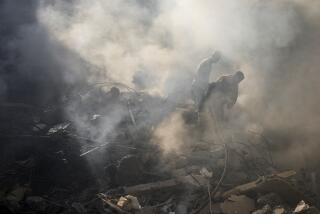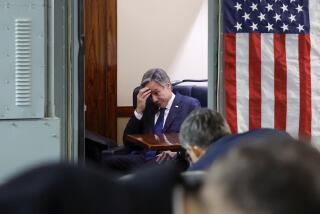NEWS ANALYSIS : Bosnia Events to Add to U.S.-U.N. Tension : Balkans: Washington had criticized reluctance to bomb rebel Serbs. Nations with troops on the ground resent pressure.
- Share via
WASHINGTON — The humiliation and killing of U.N. peacekeepers after last week’s air strikes against Serbian targets will surely worsen the Clinton Administration’s strained relations with the United Nations and France over Bosnia policy.
Only a day before Thursday’s bombing, U.S. Ambassador Madeleine Albright disputed the United Nations’ longstanding contention that renewed bombing would endanger the lives of its peacekeepers by exposing them to Bosnian Serb retaliation.
In fact, at a closed-door meeting of the Security Council, she told Lt. Gen. Bernard Janvier of France, commander of the U.N. forces in the Balkans, that the U.S. government believed that air strikes would enhance the safety of the peacekeepers rather than make their situation more dangerous. She argued that bombing would halt or slow down a deteriorating situation in which emboldened Bosnian Serbs were treating peacekeepers with contempt and increasing the pace and violence of the war.
Even after the Serbs started shelling Muslim towns, Albright tended to downplay the intensity of their retaliation. Interviewed on PBS’ “MacNeil/Lehrer NewsHour” on Thursday, she said: “Frankly, it is not unexpected that there would be this kind of retaliation at the beginning. The Bosnian Serbs kind of flex and then they often do comply.” Within a day, however, it became clear that the Serbs did not intend to comply.
The decision to bomb was hardly an American decision. The United Nations, NATO, Britain, France and the United States all agreed. And the decision was not made only because of U.S. lobbying--many diplomats and officials felt it immoral to stand by and allow the Bosnian Serb killing of civilians to go on.
“We are at our wits’ end,” a senior French diplomat said a few weeks ago. “We have tried everything, and we do not know what to do.”
But many U.N. officials and European diplomats had given up the idea of renewed air strikes six months ago when the Serbs detained dozens of peacekeepers in the wake of the bombing of an air base and two missile sites. It was U.S. insistence that kept the idea of bombing alive. If the latest air strikes lead to debacle, it would thus be easy to blame the United States.
U.N. officials and European diplomats have long resented pressure from the United States when Washington has no troops in Bosnia-Herzegovina. The French have 3,835 troops in Bosnia, the largest U.N. peacekeeping contingent there.
On Wednesday, Albright was asked by a reporter if she would still be a strong advocate of bombing if there were U.S. troops in Bosnia. The ambassador described the question as hypothetical and refused to reply. When she left, one of her senior aides berated the journalist for asking such an “insulting” question. He said that the United States cares deeply about the lives of all peacekeepers.
This issue, however, has been raised in the highest circles. French Prime Minister Alain Juppe dismissed U.S. pressure to bomb several months ago when he was foreign minister. “There is a division of tasks which I don’t think is acceptable--that of having some flying in planes and dropping bombs and others, especially the French, on the ground,” he said.
U.N. officials have been upset by American criticism of Secretary General Boutros Boutros-Ghali and his envoy, Yasushi Akashi, for their reluctance to bomb.
*
A senior U.S. official said Wednesday that Washington could no longer accept the secretary general’s advocacy of “the same old UNPROFOR [U.N. Protection Force], with the same old rules of engagement, the same old reluctance to use air power.”
These remarks prompted a U.N. official to reply, “We should be finding common avenues to a solution instead of inflaming the debate by personal attacks.”
U.N. officials also have shown annoyance at U.S. support of the Bosnian Muslims. The officials insist that moral support deludes the Bosnian government into believing that some kind of rescue team is on its way and encourages the government to provoke the Serbs.
Janvier shocked some members of the Security Council on Wednesday when he reported that Bosnian government snipers, not Bosnian Serb snipers, were responsible for the deaths of two French peacekeepers several weeks ago. That news strengthened the U.N. view that it is unwise to take sides in this war.
More to Read
Sign up for Essential California
The most important California stories and recommendations in your inbox every morning.
You may occasionally receive promotional content from the Los Angeles Times.













